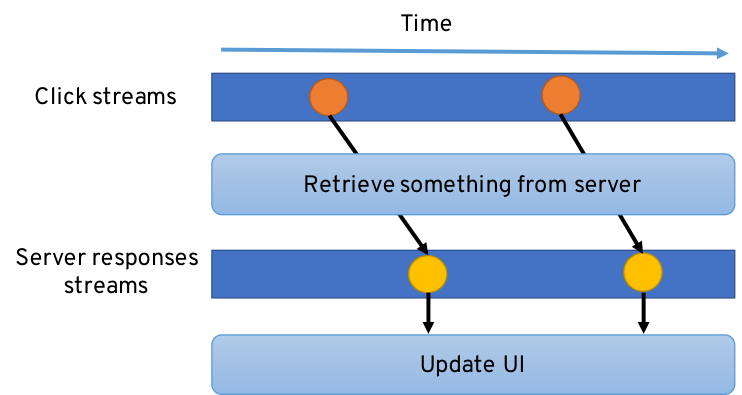In computing, reactive programming is a declarative programming paradigm concerned with data streams and the propagation of change. This means that it becomes possible to express static (e.g. arrays) or dynamic (e.g. event emitters) data streams with ease via the employed programming language(s), and that an inferred dependency within the associated execution model exists, which facilitates the automatic propagation of the change involved with data flow.
Reactive, what an overloaded word. Many things turn out to become magically Reactive these days. In this post, we are going to talk about Reactive Programming, i.e. a development model structured around asynchronous data streams.
I know you are impatient to write your first reactive application, but before doing it, there are a couple of things to know. Using reactive programming changes how you design and write your code. Before jumping on the train, it’s good to know where you are heading.
In this post, we are going to explain five things about reactive programming to see what it changes for you.
1. Reactive Programming Is Programming With Asynchronous Data Streams
When using reactive programming, data streams are going to be the spine of your application. Events, messages, calls, and even failures are going to be conveyed by a data stream. With reactive programming, you observe these streams and react when a value is emitted.
So, in your code, you are going to create data streams of anything and from anything: click events, HTTP requests, ingested messages, availability notifications, changes on a variable, cache events, measures from a sensor, literally anything that may change or happen. This has an interesting side-effect on your application: it’s becoming inherently asynchronous.

Reactive eXtension (http://reactivex.io, a.ka. RX) is an implementation of the reactive programming principles to “compose asynchronous and event-based programs by using observable sequence”. With RX, your code creates and subscribes to data streams named Observables. While Reactive Programming is about the concepts, RX provides you an amazing toolbox. By combining the observer and iterator patterns and functional idioms, RX gives you superpowers. You have an arsenal of functions to combine, merge, filter, transform and create the data streams. The next picture illustrates the usage of RX in Java (using https://github.com/ReactiveX/RxJava).

While RX is not the only implementation of the reactive programming principles (for instance we can cite BaconJS – http://baconjs.github.io), it’s the most commonly used today. In the rest of this post, we are going to use RxJava.
Reactive functional programming interview questions
Reactive functional programming interview questions

0 comments:
Post a Comment